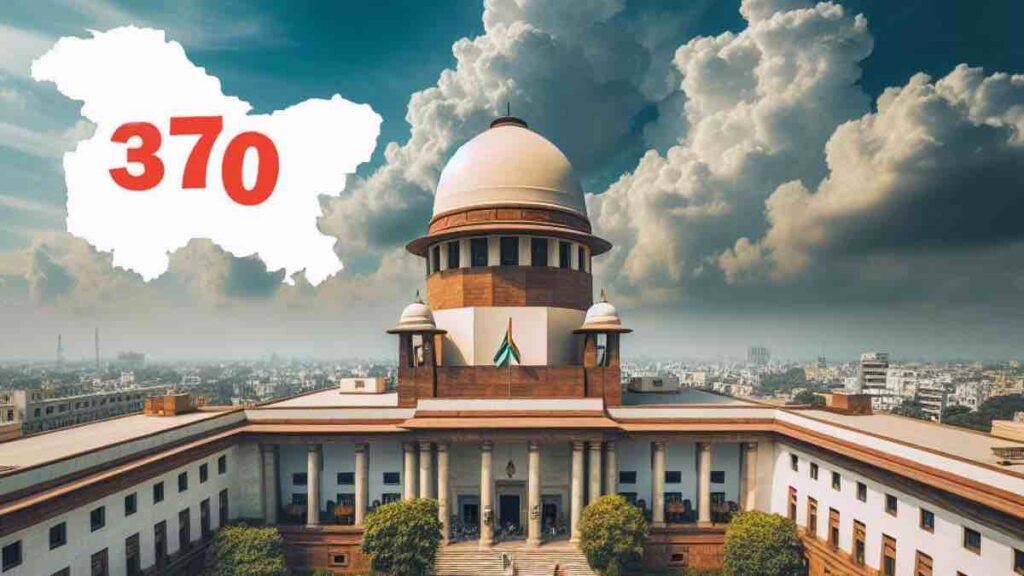
In a landmark 5-0 unanimous decision, the Supreme Court affirmed the government’s abrogation of Article 370 of the Constitution on December 11. Chief Justice of India (CJI) D Y Chandrachud and Justice Sanjay Kishan Kaul provided separate yet concurring opinions, addressing three pivotal questions raised in the petitions.
Jammu and Kashmir’s ‘Unique’ Status:
The Supreme Court clarified that Jammu and Kashmir lost its sovereignty after joining the Indian Union in 1947. Despite Maharaja Hari Singh’s initial proclamation retaining sovereignty, his successor Karan Singh declared the supremacy of the Indian Constitution over all state laws. The court asserted that this was akin to a merger, aligning Jammu and Kashmir with other princely states that joined India. CJI Chandrachud emphasized J&K’s integral part in India, citing Section 3 of the state’s Constitution alongside Article 1 and 370 of the Indian Constitution.
Article 370: ‘Temporary’ or Permanent?
The court declared Article 370 as a temporary, transitional provision. CJI Chandrachud adopted a textual approach, referring to historical context and its placement in Part XXI of the Constitution, dedicated to temporary provisions. He highlighted that the temporary nature of Article 370 served a specific purpose during the tumultuous state of affairs in 1947.
Abrogation of Article 370:
The Supreme Court upheld both presidential proclamations of August 2019, a crucial aspect of the legal challenge. The proclamations, including the redefinition of the “constituent assembly of Jammu and Kashmir” as the “Legislative Assembly of Jammu and Kashmir,” faced scrutiny. The court referred to the 1994 ‘SR Bomma v Union of India’ ruling, asserting that the President, acting as the Governor in J&K’s case, can assume various roles of the state legislature. CJI Chandrachud emphasized that such actions must be judicially tested only in extraordinary cases, and there was no prima facie evidence of malefice or extraneous exercise of power.
The Supreme Court’s decisive rulings reinforce the government’s stance on Article 370, settling key legal questions surrounding Jammu and Kashmir’s status and the constitutional provision’s temporal nature.
MOST KEY POINTS

- The Supreme Court, in a unanimous 5-0 ruling, upheld the government’s abrogation of Article 370.
- Chief Justice of India (CJI) D Y Chandrachud and Justice Sanjay Kishan Kaul provided separate but concurring opinions.
- Jammu and Kashmir lost its sovereignty after acceding to the Indian Union in 1947.
- Despite Maharaja Hari Singh’s initial proclamation, his successor Karan Singh declared the supremacy of the Indian Constitution over state laws.
- The court deemed this akin to a merger, aligning Jammu and Kashmir with other princely states that joined India.
- CJI Chandrachud cited Section 3 of the J&K Constitution, alongside Article 1 and 370 of the Indian Constitution, emphasizing J&K’s integral part in India.
- Article 370 was affirmed as a temporary, transitional provision by the Supreme Court.
- CJI Chandrachud’s textual approach considered historical context and placement in Part XXI of the Constitution, dedicated to temporary provisions.
- The temporary nature of Article 370 was seen as serving a specific purpose during the tumultuous state of affairs in 1947.
- The Supreme Court upheld both presidential proclamations of August 2019, confirming the abrogation of Article 370, and referred to the ‘SR Bommai v Union of India’ ruling on the powers and limitations of the Governor under President’s rule.
